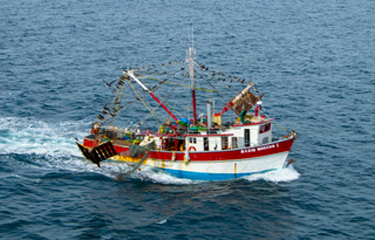US lifting import ban on wild-caught shrimp from Mexico

The United States is lifting its ban on wild-caught shrimp from Mexico, according to the Mexican government and the Sustainable Fisheries Partnership.
In April, the U.S. State Department banned exports of Mexican wild shrimp because Mexico’s efforts to protect sea turtles were “no longer comparable to that of the United States."
SeafoodSource contacted the U.S. State Department on Wednesday, 20 October, but the agency declined to confirm the ban will be lifted, and there has been no update the Federal Register. However, in a press release and video, Mexico’s Secretary of Agriculture and Rural Development and Mexico’s National Commission of Aquaculture and Fishing (CONAPESCA) confirmed they had received confirmation from the United States that the ban will be removed.
“Today, we recovered our export certification allowing us to export shrimp to the United States,” CONAPESCA Head Octavio Almada Palafox said in the video, posted 19 October. “This means that all Mexican shrimp is now able to be exported to the United States.” [A U.S. ban on the import of shrimp caught in the upper Gulf of California remains in place due to Endangered Species Act concerns related to the vaquita.]
U.S. seafood trade association National Fisheries Institute also confirmed to SeafoodSource the ban had been lifted.
“We are pleased the Mexican government has taken appropriate steps to assure the U.S. State Department that they have an adequate turtle-protection program in place,” NFI Vice President of Communications Gavin Gibbons said in an email.
In its press release, the Mexican government said its program to reduce the incidental capture of sea turtles with the use of sea turtle-excluder devices (TEDs) in its shrimp fisheries, is now comparable to the United States program, pursuant to the United States’ Section 609 program.
“Since 30 April, 2021, the Mexican government has made a strong commitment to recover this certification as soon as possible. To this end, a U.S. delegation was invited and received from 16 to 30 September, 2021, made up of Mr. Jared Milton, from the [U.S.] State Department, and … Blake [Price], from the National Oceanic and Atmospheric Administration,” it said. “In those two weeks, DET verification visits and coordination meetings were carried out in the following ports on both coasts: Tampico, Tamaulipas; Campeche, Campeche; Puerto Peñasco and Guaymas, Sonora; and Topolobampo, Mazatlán and the fishing community of La Reforma, Sinaloa.”
Mexican Secretary of Agriculture and Rural Development Víctor Manuel Villalobos Arámbula said Mexico is committed “to the sustainable production of Mexican shrimp through effective and comparable measures that ensure the conservation and protection of sea turtles.”
“This certification clearly demonstrates that there is openness, respect and a strong commitment between the governments of Mexico and the United States to strengthen dialogue and relations in international fisheries matters,” he said.
Sustainable Fisheries Partnership Senior Improvements and Strategy Manager Megan Westmeyer, who has headed SFP’s efforts to improve the sustainability of the wild-catch Mexican shrimp fishery, said the U.S. government’s formal removal of the ban is “imminent.” She said the Mexican government would not have put out an official press release without receiving a formal notification via diplomatic cable to its embassy in Washington D.C. Once the notice is published in the Federal Register, the U.S. State Department will begin to inform other government agencies, including U.S. Customs and Border Protection, so they can begin allowing Mexican shrimp over the border.
According to Westmeyer’s best estimate based off Mexican and U.S. government statistics, the United States annually imports around 25 to 30 million pounds of wild-caught Mexican shrimp. Westmeyer said it is her understanding even shrimp caught while the ban was in effect and stockpiled in Mexican cold storage will be allowed into the U.S. after the ban is lifted.
Westmeyer said TED compliance in the Mexican shrimp fleet began slipping toward the end of 2020, as the Mexican government stopped conducting inspections or enforcing its fisheries regulations, which Westmeyer blamed on a federal funding crunch and the COVID-19 pandemic. Mexican fishers catch slightly more shrimp with each haul – Westmeyer’s estimate is around 2 percent – by not using TEDs, so they were incentivized to cease their use, though they lose time sorting through much higher levels of bycatch.
Once the ban was instituted, the Mexican government initiated political negotiations with the United States and introduced an official plan of action for the conservation of sea turtles to a U.S. contingent of diplomats in August. That plan included training on TED installation, use, and maintenance and greater enforcement efforts, according to Westmeyer. U.S. State Department officials conducted further inspections “up and down the Pacific coast” at the end of this summer and found “lots of compliance,” she said.
“It was high enough where they could reissue the certification,” Westmeyer said.
The ban had little actual economic impact on the shrimp industry because it came during the fishery’s seasonal closure. The artisanal fishery reopened in mid-September and the industrial fishery opened at the end of September, with most of the catch going into cold storage, awaiting the lifting of the ban, Westmeyer said. Catch rates have been down significantly thus far this season – up to 50 percent – so there has been less product than normal to store, she said.
Westmeyer said the TED problem and other issues impacting the Mexican wild-caught shrimp fishery are being addressed through SFP’s Mexican Shrimp Supply Chain Roundtable, which was founded in April 2021 in order to push for more effective action on sustainability, after SFP “learned of extensive laundering of illegal gillnet-caught shrimp from the upper Gulf of California, done in order to circumvent U.S. embargos and maintain access to the U.S. market.”
Companies participating in the roundtable thus far include Eastern Fish, Amende & Schultz, Ocean Garden, Del Pacifico Seafoods, Deep Sea Shrimp Importing, and Buena Vista Seafood. All have agreed to adhere to “stricter requirements for participation than we previously had,” including mandatory third-party audits and the requirement that the results be shared with SFP, which will be bound to secrecy via non-disclosure agreements, Westmeyer said.
“What we are asking for is complicated and expensive, and now we’re going to have to require everyone for follow through,” she said. “SFP will act as an independent third-party ensuring that they have completed all their audits and are appropriately dealing with the results. If one of these companies does not complete all their audits or we notice a problem in their supply chain that they’re not adequately addressing, we will eventually remove them from the SR.”
SFP doesn’t yet have any set mechanism for removal from the SR “because we’re hoping for full compliance,” Westmeyer said.
SFP has undertaken the roundtable initiative as part of its organization-wide model of “pushing down the supply chain to get the improvements made,” according to Westmeyer.
“In some cases, we’ve talked to major retailers and foodservice purchasers who are buying Mexican shrimp, and they’re asking for their supply chains to be cleaned up,” she said. “But some companies joined not because they had any buyer pressure but because they knew the problems were happening, they’ve seen them affect the consistency and availability of their supply, and they know it’s something that has to change.”
Westmeyer mentioned the USMCA Agreement as another potential source of problems for the wild-caught Mexican shrimp fishery if it doesn’t improve its processes.
“USMCA has a whole section on environmental provisions that could lead to a future embargo or other consequences under that as well,” she said. “Tolerance of IUU fishing right now is really decreasing and so this is something going to see a lot more of in the future.”
Photo courtesy of CONAPESCA






Share